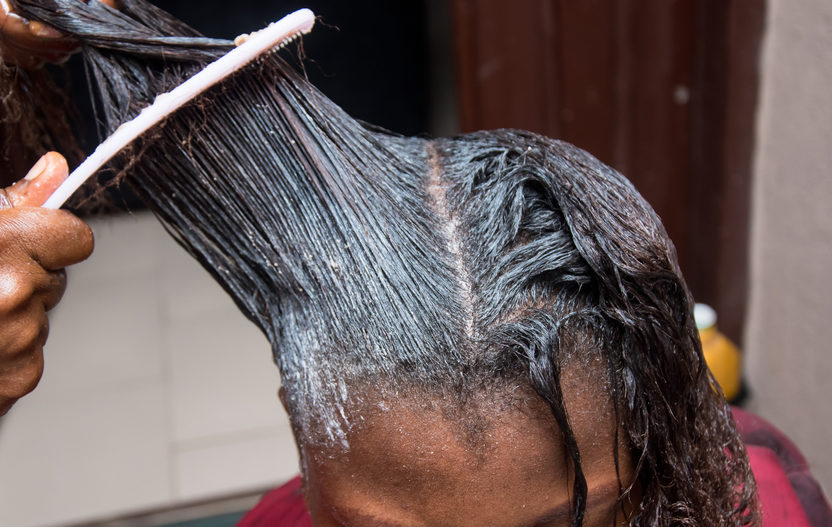In a new study released last month, researchers from the U.S. National Institutes of Health (NIH) have found a link between hair straightening chemicals and an increased risk of uterine cancer. The findings are alarming for the millions of women who use these products. These chemicals are used in hair salons by professionals but are also sold in grocery stores and beauty supply shops for people to use at home. Many hair straightening labels advertise natural ingredients without warning about the serious adverse health effects the products can cause. According to the study, Black women may be at a higher risk of developing the disease because hair straighteners are more popular among the demographic.
The study examined more than 33,000 women between the ages of 35 and 74. Researchers followed the women for almost 11 years. They found that women who reported frequent use of hair straightening chemicals — more than four times in the previous year — were more than twice as likely to develop uterine cancer. Only 1.64% of women who’ve never used hair straightening chemicals are diagnosed with uterine cancer by 70 years old. In contrast, more than 4% of women who have used these hair products will develop the condition.
In the weeks since the release of the NIH study, women have filed hair straightener cancer lawsuits against L’Oreal, Revlon, and other cosmetic companies. They say they were diagnosed with uterine cancer after frequently using hair straightening products and, in some cases, had no other risk factors or family history of the disease.
Uterine Cancer Statistics
Uterine cancer is a rare disease that primarily affects post-menopausal women. Endometrial cancer, which is more prevalent and easier to treat, is one type of uterine cancer. It develops in the lining of the uterus and accounts for the majority of cases. Uterine sarcoma is a more aggressive form of cancer that develops in the muscles of the uterus and is harder to cure.
The signs of uterine cancer can be easily confused with other pelvic conditions. Someone might experience unusual vaginal bleeding and spotting, pelvic pain, stomach discomfort, or trouble using the bathroom. To diagnose the disease, a medical professional will biopsy uterine tissue and may also perform an ultrasound.
The best treatment option will depend on the aggressiveness of cancer. Doctors often recommend surgery to completely remove the uterus, which also prevents a patient from ever getting pregnant and causes surgical menopause. Other options might include chemotherapy or radiation. The prognosis for endometrial cancer is promising, with an 81% five-year survival rate. Uterine sarcoma has a 50% five-year survival rate, which drops to 8% to 12% among women with advanced cases of the disease.
What Are Hair Straightening Chemicals?
Hair straightening products are effective because of the chemicals they contain. These chemicals help loosen curls by breaking disulfide bonds, changing the texture of the hair. Hair straightening products can last for months. Parabens, bisphenol A, metals, and formaldehyde have all been found in these products. Even short-term exposure to these chemicals can harm human health, and repeated interactions aren’t recommended. Relaxers can cause burns and irritation, leading to increased absorption of chemicals through the scalp.
Hair straighteners include an ingredient list on the label, but many products market natural oils and the product’s soothing components. There are usually warnings about proper use and what to do if the product is accidentally ingested, but no information about the potential link to cancer. Women diagnosed with uterine cancer after using the products have started to file lawsuits against the companies that make hair straightening products, alleging that the manufacturers had a duty to warn consumers about the potential health hazards.
This isn’t the first indicator that hair straightening chemicals may cause serious problems. The products have also been associated with breast and ovarian cancers in previous studies. Researchers say that further studies are needed to determine which chemicals increase cancer risk and whether the products contribute to health disparities. Uterine cancer is on the rise, especially among Black women.
Next Steps for Women Injured by Hair Straighteners
It’s unclear whether the companies being sued for their hair straightener products will settle the lawsuits out of court or if they’ll go to trial. However, more hair straightener cancer lawsuits will likely be filed as women learn about the connection between their uterine cancer diagnoses and the hair products they use often.
Women who have used chemical hair straighteners and developed uterine or breast cancer can consult an experienced hair straightener lawyer to determine whether they have a valid claim and possible legal options. You may be eligible for compensation for medical costs, lost income, and other fees incurred from developing cancer.










